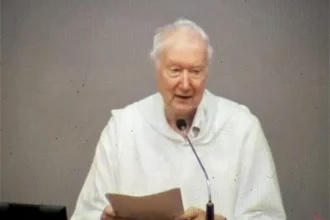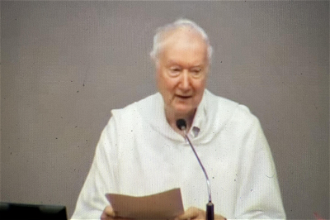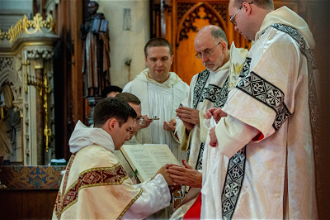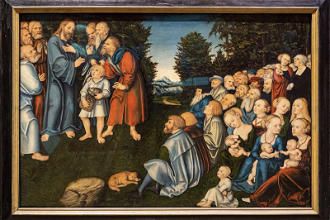Greenbelt report: Timothy Radcliffe speaks on challenge of the Gospels - 1 September 2006
LONDON - 11 September 2006 - 1,190 words
Greenbelt report: Timothy Radcliffe speaks on challenge of the Gospels - 1 September 2006
Timothy Radcliffe OP, gave two wide-ranging talks on the theme of the 'intoxication' and challenge of the Gospels during his two days at the Greenbelt Festival on 27 and 28 August.
After each session he took questions from his large and attentive audience on issues such as the position of women in the Church; the role of the Vatican; morality and war.
During his first talk, in response to a question about women in the Church, he said: "Concerning the freedom and liberation of women, it is clear we are at the very smallest beginning of what needs to be done. We have barely begun to face the issue and it is one of the most important questions the Church must face."
When asked whether the Vatican was an Old Boy's club, he said: "I think the Vatican should be reformed. Fundamental issues about the shape of the Church need to be tackled. The Vatican should be seen to be at the service of the Church not as a controlling body."
But he added: "We should not be obsessed with the Vatican but instead be excited by the Gospel. Too often, we commit the strange heresy of thinking the Church is primarily the clergy. We must recover the sense that we are Church. Look at the patrons of Europe: Benedict, Francis of Assisi, Catherine of Siena. They were all lay."
Speaking about postmodernism and cultural confusion of values, he said: "Commentators tend to exaggerate the threat of relativism. We are feeling our way through to quite a healthy sense of pluralism in which we can talk in different ways, with different frames of reference and different vocabularies."
On questions about guilt over issues as global warming, Aids, war and famine, Fr Timothy said: "Christians do not have a good and helpful language with which to talk about sin." Too often, he said, current moral discourse made people feel guilty in a psychological sense. It was absolutely right to face up to our failings on a global scale. But, he added: "We should not try to cultivate an oppressive sense of guilt. We must discover a more objective sense so that when we examine our failings we can understand that God has forgiven us already. When we feel sorrow, God's grace is indeed working within us."
He cautioned: "Ultimately, we can't share in God's happiness unless We share in God's sorrow." Quoting from the Catholic human rights campaigner James Mawdsley, who was imprisoned in Burma, he said: "Humanity is one body. We cannot move forward except together."
Fr Radcliffe had recalled how, in his faith, he was always drawn back to Christ's words at the Last Supper which he called the great feast of freedom: "This is my body, given to you."
"There is a crisis of hope, and real fears for the future, in our society," he said. Yet he dwelt on the Last Supper. "Christians look back for hope when there was no hope; for a future when there was no future; for community when community was collapsing. They look back to that dark moment when Jesus made a sign."
"God is interested in us sharing his freedom for it was into freedom that Christ set us free."
During his second talk, Fr Timothy expanded on what he understood by Christian freedom.
"So often in the Church we feel the Church treats people as six-year-olds, incapable of moral decisions," he said.
"People are in all sorts of situations: gay, divorced etc. It is from where they are that the journey to the Kingdom starts."
"All religious formation should be an act of friendship. We should have nothing to say to anybody unless they feel God's pleasure in them, God's face shining upon them."
"Of course, we need rules the Ten Commandments to savour God's freedom. These are not external constraints but enclose what we most profoundly wish to do. They are like musical scales for a jazz player. One needs to master the scales so that one can play freely, improvise."
"Spontaneity does not mean doing the first thing that enters one's head. It means acting from the very core of one's being where God is. We should act not react."
But Fr Radcliffe emphasised that Christians, in their freedom, were Bound together in mutual love and respect: "If we just focus on the language of moral agency, then the Christian becomes a rugged individual, the lone ranger of the moral universe."
"If we are to share the life of Jesus, we share his freedom to associate with all, with no exclusion."
"Greenbelt is a wonderful sign of the freedom we have to belong to each other."
"Even inside the Catholic Church, there are terrible divisions between progressives and conservatives."
"But there is no sign of Christ's freedom until we dare to belong to each other across divisions. Only then will there be a sign of Christ's freedom."
Deepest freedom was, he said, the freedom to do what right, whatever the consequences.
In his previous talk, Fr Radcliffe had recalled the martyred Bishop Pierre Clavéry in Algeria who refused to be cowed by terrorist insurgents, paid with his life, and was hailed as the Bishop of the Muslims, too.
"His sign of freedom and courage inspires me to this day," he said.
Fr Timothy also paid homage to a Dominican lawyer friend in Brazil, who was one of the most outspoken opponents of slavery on the enormous farm estates in the country and who had a $30,000 bounty on his head.
He denounced expediency which he identified as being so often cited in order to justify doing what was wrong.
"At the start of World War Two, it was considered universally unacceptable to blanket-bomb innocent civilians. But consider Dresden, Hiroshima and Nagasaki, Guantanamo Bay and special renditions which have led to the torture of people."
"The perpetrators of these acts say, sorrowfully, regretfully, we had no option, just as during the Vietnam War the US administration said: 'We had no choice but to destroy the village in order to save it from the Communists.'
"We must courageously resist the temptations of expediency. No end justifies the means," he said.
Fr Radcliffe hailed Archbishop Romero's final sermon before he died when he addressed the soldiers patrolling the outskirts of the congregation and appealed to them not to kill their fellow citizens for such was the law of God and no-one should obey an immoral human law.
"This was one of the great summons to freedom of the twentieth-century," he said. "Romero knew he would pay with his life."
"In Romero's last homily, he made clear that God was the protagonist of history and only God-like acts could forward anything."
"We must act from the core of our being, learning something of the spontaneity of Jesus."
Answering a question about Just War, he said, the start of World War Two was arguably just, but as it went on people engaged in acts that were wrong, and stopped respecting innocent civilians.
With the kind of weapons we have now, Fr Timothy said he wondered now whether any war could be described as just.
Source: ICN





















